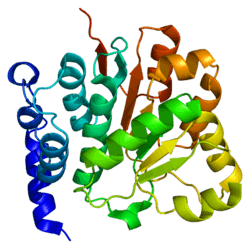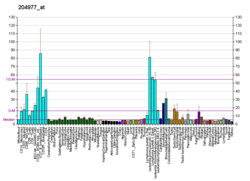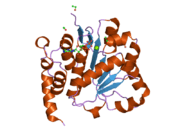DDX10
Probable ATP-dependent RNA helicase DDX10 is an enzyme that in humans is encoded by the DDX10 gene.[3][4]
DEAD box proteins, characterized by the conserved motif Asp-Glu-Ala-Asp (DEAD), are putative RNA helicases. They are implicated in a number of cellular processes involving alteration of RNA secondary structure such as translation initiation, nuclear and mitochondrial splicing, and ribosome and spliceosome assembly. Based on their distribution patterns, some members of this family are believed to be involved in embryogenesis, spermatogenesis, and cellular growth and division. This gene encodes a DEAD box protein, and it may be involved in ribosome assembly. Fusion of this gene and the nucleoporin gene, NUP98, by inversion 11 (p15q22) chromosome translocation is found in the patients with de novo or therapy-related myeloid malignancies.[4]
References
- ↑ "Human PubMed Reference:".
- ↑ "Mouse PubMed Reference:".
- ↑ Savitsky K, Ziv Y, Bar-Shira A, Gilad S, Tagle DA, Smith S, Uziel T, Sfez S, Nahmias J, Sartiel A, Eddy RL, Shows TB, Collins FS, Shiloh Y, Rotman G (Jan 1997). "A human gene (DDX10) encoding a putative DEAD-box RNA helicase at 11q22-q23". Genomics. 33 (2): 199–206. PMID 8660968. doi:10.1006/geno.1996.0184.
- 1 2 "Entrez Gene: DDX10 DEAD (Asp-Glu-Ala-Asp) box polypeptide 10".
Further reading
- Olsen JV, Blagoev B, Gnad F, et al. (2006). "Global, in vivo, and site-specific phosphorylation dynamics in signaling networks.". Cell. 127 (3): 635–48. PMID 17081983. doi:10.1016/j.cell.2006.09.026.
- Andersen JS, Lam YW, Leung AK, et al. (2005). "Nucleolar proteome dynamics.". Nature. 433 (7021): 77–83. PMID 15635413. doi:10.1038/nature03207.
- Gerhard DS, Wagner L, Feingold EA, et al. (2004). "The status, quality, and expansion of the NIH full-length cDNA project: the Mammalian Gene Collection (MGC).". Genome Res. 14 (10B): 2121–7. PMC 528928
 . PMID 15489334. doi:10.1101/gr.2596504.
. PMID 15489334. doi:10.1101/gr.2596504.
- Wang SC, Lien HC, Xia W, et al. (2004). "Binding at and transactivation of the COX-2 promoter by nuclear tyrosine kinase receptor ErbB-2.". Cancer Cell. 6 (3): 251–61. PMID 15380516. doi:10.1016/j.ccr.2004.07.012.
- Strausberg RL, Feingold EA, Grouse LH, et al. (2003). "Generation and initial analysis of more than 15,000 full-length human and mouse cDNA sequences.". Proc. Natl. Acad. Sci. U.S.A. 99 (26): 16899–903. PMC 139241
 . PMID 12477932. doi:10.1073/pnas.242603899.
. PMID 12477932. doi:10.1073/pnas.242603899.
- Andersen JS, Lyon CE, Fox AH, et al. (2002). "Directed proteomic analysis of the human nucleolus.". Curr. Biol. 12 (1): 1–11. PMID 11790298. doi:10.1016/S0960-9822(01)00650-9.
- Nakao K, Nishino M, Takeuchi K, et al. (2000). "Fusion of the nucleoporin gene, NUP98, and the putative RNA helicase gene, DDX10, by inversion 11 (p15q22) chromosome translocation in a patient with etoposide-related myelodysplastic syndrome.". Intern. Med. 39 (5): 412–5. PMID 10830185. doi:10.2169/internalmedicine.39.412.
- Zuber J, Tchernitsa OI, Hinzmann B, et al. (2000). "A genome-wide survey of RAS transformation targets.". Nat. Genet. 24 (2): 144–52. PMID 10655059. doi:10.1038/72799.
- Ikeda T, Ikeda K, Sasaki K, et al. (1999). "The inv(11)(p15q22) chromosome translocation of therapy-related myelodysplasia with NUP98-DDX10 and DDX10-NUP98 fusion transcripts.". Int. J. Hematol. 69 (3): 160–4. PMID 10222653.
- Liang WQ, Clark JA, Fournier MJ (1997). "The rRNA-processing function of the yeast U14 small nucleolar RNA can be rescued by a conserved RNA helicase-like protein.". Mol. Cell. Biol. 17 (7): 4124–32. PMC 232266
 . PMID 9199348.
. PMID 9199348.
- Arai Y, Hosoda F, Kobayashi H, et al. (1997). "The inv(11)(p15q22) chromosome translocation of de novo and therapy-related myeloid malignancies results in fusion of the nucleoporin gene, NUP98, with the putative RNA helicase gene, DDX10.". Blood. 89 (11): 3936–44. PMID 9166830.
PDB gallery |
|---|
| 2pl3: Human DEAD-box RNA helicase DDX10, DEAD domain in complex with ADP |
|
|


 . PMID 15489334. doi:10.1101/gr.2596504.
. PMID 15489334. doi:10.1101/gr.2596504. . PMID 12477932. doi:10.1073/pnas.242603899.
. PMID 12477932. doi:10.1073/pnas.242603899. . PMID 9199348.
. PMID 9199348.